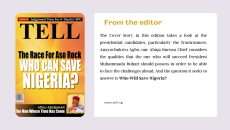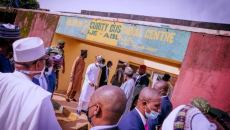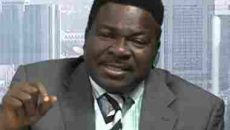Bala Muhammed, former minister of Federal Capital Territory, FCT is one of former president, Goodluck Jonathan’s trusted aides. He said that Jonathan made the historic call to Buhari conceding victory without the knowledge of his kitchen cabinet. Had Jonathan consulted, maybe the story would have been different.
Muhammed regrets that lack of internal party democracy; disunity and the Buhari phenomenon caused the defeat of his party, People’s Democratic Party, PDP in the last election. He spoke to Anayochukwu Agbo, general editor and Tajudeen Suleiman, senior associate editor, in Abuja. Excerpts:
 What was it like running the FCT for about five years?
What was it like running the FCT for about five years?
It has been a big opportunity to superintend over a territory that is the attraction of every Nigerian and indeed every African. But it is not without a lot of challenges and problems here and there, some of them surmountable and some of them insurmountable. The vision of the founding fathers of FCT is to provide an administrative capital for Nigeria’s 170 million people. But as it is you have to mix commercial and administrative responsibilities for us to have the required mix; that is the mode of all modern cities in the world. You are supposed to provide infrastructure and services – social, health, educational services and all aspects that would enhance the quality of life for residents.
We inherited a territory that had lot of problems in the areas of infrastructural provision, and it was impinging on the provision of services. For example, in transportation, there were no trains, the taxis were dilapidated and the mass transit was almost collapsing because there was no maintenance or financial plan for it to work. We also inherited a docile bureaucracy but it was not their fault because they had not been really trained to innovate and re-create away from the normal budgetary system they were used to. We inherited a land administration that was chaotic, corrupt and was hardly enhancing the timeline for the development that it was set up to achieve.
We inherited a financial system that was prone to leakages with little or no money generated from IGR and of course with a lot of debts in terms of contractual obligations and the payment of overheads and salaries and wages. We inherited a system where the health services and the educational services can hardly meet the demand of the population. We inherited a master-plan that was insensitive to the needs of the supporting staff, the medium and low level manpower that would require affordable and social housing and a rent system that are affordable within the framework of their wages and salaries. We inherited a system where resettlement and compensation, rather than creating avenues for urban renewal and movement, was impinging negatively on the original inhabitants. So that was where we were at inception.
What were the reforms you carried out to reposition the FCTA?
Our predecessor did so much to ensure that some of these challenges were tackled with initiatives such as the mass housing, the Abuja light rail, the Abuja mass transit and so on. So what we did was to imbibe the culture of continuity, and at the same time reposition the bureaucracy towards maximizing their capacities.
At the same time we knew that we had to take FCT from where it was to a better place in line with the federal government vision to make the best city by year 2020. We did some reforms in land administration. We changed the payment of the premium system. We established an e-portal for payment of premium and other charges. We were able to enhance the capacity of AEGIS to be impregnable to corrupt practices. It enhanced our IGR by 40 percent. That improved our capacity to pay for overheads, salaries and other things. In essence, we repositioned the bureaucracy towards servicing the various statutory responsibilities of the FCT.
We increased the IGR by trying to institutionalize the collection with a robust law that would guide it. That is why we have the Revenue Board being established by the FCT to collect property tax. We have come together with the area council to make sure we come up with a framework for collection and sharing, akin to what is happening in Lagos. Also, we believe that through property tax and outdoor advertising, we can raise funds. Again we tried to look at the chaotic transportation system that we inherited. The light rail that is supposed to be the key in terms of removing the bulk of commuters was not there. With the help of the (ex-) president, we got the loan from China and through SURE-P and IGR, we were able to pay our counterpart funding. We have taken literail to a place of no return (about 65%) that it can be completed by December 2015. In addition to that, we provided high capacity mass transit buses without the encumbrances of loan. This is the first time a government is coming with a transportation system that is workable because it is bankable. Even the banks are craving to buy 10, 000 taxis now.
On infrastructure, what are you leaving behind?
We have expanded the roads. The Airport Road was expanded. The Kubwa Road was also expanded; we inherited these projects at ground breaking level. We have finished the City-Centre Road. We have expanded the Wuye District. Same with Jahi and Kagini; we inherited them and finished them. You can see the roads we are doing all across the Federal Capital. So we have done a lot of things to move Abuja forward.
One of the landmark projects of your administration was the landswap projects. What are your fears about this project now that a new government has come in?
We had to invite private investors to complement what we are doing. Landswap is one of these projects. There has been a lot of infrastructural deficit in the implementation of the Abuja master plan. The concept of Abuja is hinged on the development of 78 districts in four to five phases; satellite towns and eight sector areas. When we came in only 11 districts were done and we had a population of two million then. But now we have about five to six million people. So we had to do something because even the projects we had on ground, government could not pay. So what did we do? We decided to borrow from global best practices; that was why we came up with the landswap.
By the landswap, we give virgin districts, similar to Maitama and Wuse, to companies to provide primary infrastructure and create developable land with water and electricity. They would take a sizeable percentage of the land as their own as a form of payment rather than paying them money.
What impact have all these made in the lives of Abuja residents?
In terms of improving the quality of life, we have provided recreational facilities, shopping and recreation. The Jabi Multipurpose Mall is almost completed. We have seen the World Trade Centre, which would cost about $2billion. But the most important thing is the Abuja City Centre, which will cost $3.5 billion. It is the heart of Abuja. It is going to have hotels, restaurants, residences and offices; just something akin to Oxford Street of London or the Ulysses of Paris or the Mahatma in the United States, because there is no city without a heart. Also we are developing a city within a city called the Centenary City. It is going to fetch about $18 billion. It is not about the infrastructure but the economics of it because it is going to enhance our IGR; it will create employment and raise the GDP of the residents of the city.
You and the former chairman of the PDP are from Bauchi State, which was under the control of the Peoples Democratic Party during the last election but your party lost in the governorship and presidential election. Does it mean that people like you are not popular at home?
I am sorry about the loss of the election, but there was nothing we did not do to win that election. I must be honest with you, we the stakeholders did not come together as we should be. But even if we did, there was a wind of change in the country brought about by Muhammandu Buhari, it was really very difficult for us because of his popularity. Buhari is like a colossus in Bauchi state; people really love him so much and it was difficult for us despite our campaign, and giving of course, our lack of unity. But we have taken it in good faith. We’re still brothers, all of us – I, the former governor Isa Yuguda, and Muazu Adamu. The blame game is not something for us.
Our brother, Adamu Muazu, has resigned as chairman of the party. The question you have not asked is who will fill the gap from the Northeast? Some of us are ready if we’re asked by the stakeholders to do it. Like me, if I’m asked to become acting chairman or chairman of the PDP, I will readily do it. Not because I was the one who pushed Muazu out but because I want to make a difference and serve the party that has done so much for me in terms of giving me the opportunity to become FCT minister and become a national figure in the manner I never expected.
What would you say accounted for the loss of former president, Goodluck Jonathan, in the whole of the North?
It is the whirl wind of the Buhari candidacy, and of course, some few hiccups here and there in the party: the primaries that were done, the fielding of candidates, the feeling of dejection and disillusionment by some members and lack of internal democracy here and there. Nigerian people wanted change, especially because of the insecurity that was blamed on our administration unfairly. You know in politics, politicians always seize opportunities, and the people were told that our administration was behind Boko Haram. And so because every Nigerian wanted to be secured, they wanted change. But certainly it was miss-information because we were never behind it and you could see that the Jonathan administration did a lot to fight insurgency. Again, there was a lot of disagreement within the leaders of the PDP. But certainly we will re-launch and re-brand ourselves.
I want to advise the new administration to take everyone as its own. The election was contested and won, and it was even with a slim margin. They got 14 million and we got 12 million, so they should know that it is half Nigeria against the other half. So they should not do anything that will cause mistrust, suspicion, division and rancour within the social fabric of the nation. I am somebody who knows the new President very well because we worked together in ANPP. He helped us to win election in Bauchi during my time as a senator. So I have a lot of respect for him. If they do away with the element of distrust, the element of witch-hunting, they would do a lot for Nigeria.
Would you say that the PDP has learnt its lessons? What are the lessons?
The lessons would be internal democracy; synergy and our interest must be the interest of the people. And of course, we must make sure we use the media very well. We lost the war on the social, print and electronic media; we only came to realize at the end of it. The issue is that as politicians we have learnt our lessons. We must be able to do some advocacy and some propaganda so that Nigerians would know what we have done. And I know it came very late but Nigerians would soon know that there was nobody that has impacted positively in terms of the provision of integrated infrastructure to Nigerians than Jonathan. In 2019, Nigerians would come to realize that we are the best platform; we’re a truly national party.
Are you not worried about the rate of decamping from the PDP?
I am not worried because some politicians are like that. But for some of us, we will remain in PDP but I don’t blame them for going there. May be by the time we reposition ourselves they will come back. Even those in APC today that are making waves were in PDP. Mind you, some of the quality people in the APC that I respect like Atiku Abubakar, Nasir El-Rufai, Rabiu Kwankwaso and others were PDP members. So what is PDP and what is APC? They’re all Nigerian people. The only thing is that some dynamics have changed, and we’re ready to reposition the PDP so that these people will come back. And by the time they come back, you will see that the other side would collapse.
What advice do you have for the new President?
My advice to the President is that he should know that he is an enigma in Nigerian politics. In Nigerian politics there is nobody that has his popularity. He is popular because of his incredible integrity, and he should not allow this integrity to be diluted by sectionalism and people who would try to settle scores using his platform and pedigree. He should know that the expectations Nigerians have of him, including us, are huge and enormous. He should give every Nigerian equal opportunity irrespective of party or ethnicity. He should continue to be detribalized, selfless and focused on addressing all the problems and challenges of Nigeria. He should make sure that he does not allow anybody to witch-hunt us – those who served in the previous administration. We are conscious of the fact that we are accountable, and we’re ready to account for our tenure anytime. I advise him to be the same person as Mandela – somebody that is a rallying point, a role model, a friend of everybody and a father of all Nigerians. That is what we have always wanted him to be.
Do you foresee some challenges ahead of him?
Yes. I have seen some challenges in terms of managing some interests that are incongruous, that are incompatible. But I think he has what it takes to make sure he manages the people that are around him. Because some of the people that helped him to win election are completely incompatible with him, knowing his principles and what he stands for. And I think he has become flexible; he has become the right person we wanted him to be – that is accommodating, including accommodating the inadequacies of others that is embedded in politics.
Do you have any regret that there were things the PDP could have done which it did not do?
I don’t have much regrets. The only regrets I have are that I wished some people were fielded for the last election, and I wished there was more internal democracy. And I wished some of us were more involved in the planning, in terms of the day to day campaign. I wished there was more collaboration.
Having worked with Jonathan for five years, what are the conclusions you could make about his character?
I think he is a well misunderstood Nigerian; someone who does not care about himself and who believes in Nigeria so much. He is somebody who is ready to work for Nigeria for the rest of his life. I have learnt the art or science of Nigerianness, of statesmanship and nationalism from him. I have learnt to be humble and honest in what I do and accommodating of all sorts of people around. Jonathan is somebody you can hardly know what he wants – for instance, the way he conceded defeat, most of us did not know when he did it. He must take the credit for himself because most of the people around him never wanted him to do that. I think he’s the greatest Nigerian living on earth.
Follow Us on Social Media


 WhatsApp us
WhatsApp us